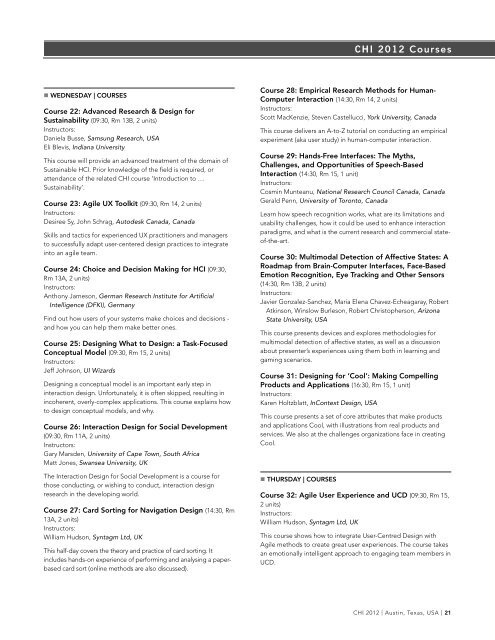Printed Program (pdf) - CHI 2012 - Association for Computing ...
Printed Program (pdf) - CHI 2012 - Association for Computing ...
Printed Program (pdf) - CHI 2012 - Association for Computing ...
You also want an ePaper? Increase the reach of your titles
YUMPU automatically turns print PDFs into web optimized ePapers that Google loves.
n WEDNESDAY | COURSES<br />
Course 22: Advanced Research & Design <strong>for</strong><br />
Sustainability (09:30, Rm 13B, 2 units)<br />
Instructors:<br />
Daniela Busse, Samsung Research, USA<br />
Eli Blevis, Indiana University<br />
This course will provide an advanced treatment of the domain of<br />
Sustainable HCI. Prior knowledge of the field is required, or<br />
attendance of the related <strong>CHI</strong> course ‘Introduction to …<br />
Sustainability’.<br />
Course 23: Agile UX Toolkit (09:30, Rm 14, 2 units)<br />
Instructors:<br />
Desiree Sy, John Schrag, Autodesk Canada, Canada<br />
Skills and tactics <strong>for</strong> experienced UX practitioners and managers<br />
to successfully adapt user-centered design practices to integrate<br />
into an agile team.<br />
Course 24: Choice and Decision Making <strong>for</strong> HCI (09:30,<br />
Rm 13A, 2 units)<br />
Instructors:<br />
Anthony Jameson, German Research Institute <strong>for</strong> Artificial<br />
Intelligence (DFKI), Germany<br />
Find out how users of your systems make choices and decisions -<br />
and how you can help them make better ones.<br />
Course 25: Designing What to Design: a Task-Focused<br />
Conceptual Model (09:30, Rm 15, 2 units)<br />
Instructors:<br />
Jeff Johnson, UI Wizards<br />
Designing a conceptual model is an important early step in<br />
interaction design. Un<strong>for</strong>tunately, it is often skipped, resulting in<br />
incoherent, overly-complex applications. This course explains how<br />
to design conceptual models, and why.<br />
Course 26: Interaction Design <strong>for</strong> Social Development<br />
(09:30, Rm 11A, 2 units)<br />
Instructors:<br />
Gary Marsden, University of Cape Town, South Africa<br />
Matt Jones, Swansea University, UK<br />
The Interaction Design <strong>for</strong> Social Development is a course <strong>for</strong><br />
those conducting, or wishing to conduct, interaction design<br />
research in the developing world.<br />
Course 27: Card Sorting <strong>for</strong> Navigation Design (14:30, Rm<br />
13A, 2 units)<br />
Instructors:<br />
William Hudson, Syntagm Ltd, UK<br />
This half-day covers the theory and practice of card sorting. It<br />
includes hands-on experience of per<strong>for</strong>ming and analysing a paperbased<br />
card sort (online methods are also discussed).<br />
<strong>CHI</strong> <strong>2012</strong> Courses<br />
Course 28: Empirical Research Methods <strong>for</strong> Human-<br />
Computer Interaction (14:30, Rm 14, 2 units)<br />
Instructors:<br />
Scott MacKenzie, Steven Castellucci, York University, Canada<br />
This course delivers an A-to-Z tutorial on conducting an empirical<br />
experiment (aka user study) in human-computer interaction.<br />
Course 29: Hands-Free Interfaces: The Myths,<br />
Challenges, and Opportunities of Speech-Based<br />
Interaction (14:30, Rm 15, 1 unit)<br />
Instructors:<br />
Cosmin Munteanu, National Research Council Canada, Canada<br />
Gerald Penn, University of Toronto, Canada<br />
Learn how speech recognition works, what are its limitations and<br />
usability challenges, how it could be used to enhance interaction<br />
paradigms, and what is the current research and commercial stateof-the-art.<br />
Course 30: Multimodal Detection of Affective States: A<br />
Roadmap from Brain-Computer Interfaces, Face-Based<br />
Emotion Recognition, Eye Tracking and Other Sensors<br />
(14:30, Rm 13B, 2 units)<br />
Instructors:<br />
Javier Gonzalez-Sanchez, Maria Elena Chavez-Echeagaray, Robert<br />
Atkinson, Winslow Burleson, Robert Christopherson, Arizona<br />
State University, USA<br />
This course presents devices and explores methodologies <strong>for</strong><br />
multimodal detection of affective states, as well as a discussion<br />
about presenter’s experiences using them both in learning and<br />
gaming scenarios.<br />
Course 31: Designing <strong>for</strong> ‘Cool’: Making Compelling<br />
Products and Applications (16:30, Rm 15, 1 unit)<br />
Instructors:<br />
Karen Holtzblatt, InContext Design, USA<br />
This course presents a set of core attributes that make products<br />
and applications Cool, with illustrations from real products and<br />
services. We also at the challenges organizations face in creating<br />
Cool.<br />
n THURSDAY | COURSES<br />
Course 32: Agile User Experience and UCD (09:30, Rm 15,<br />
2 units)<br />
Instructors:<br />
William Hudson, Syntagm Ltd, UK<br />
This course shows how to integrate User-Centred Design with<br />
Agile methods to create great user experiences. The course takes<br />
an emotionally intelligent approach to engaging team members in<br />
UCD.<br />
<strong>CHI</strong> <strong>2012</strong> | Austin, Texas, USA | 21


